Australian cricket teams are better in the role of underdog. As soon as they allow Icarus syndrome to take hold, everything backfires. Exhibit A: the 2005 Ashes.
This is a short extract from my memoir, Twelve Summers.
LORDS - FIRST TEST
In 2005, Steve Harmison cracked Justin Langer on the elbow with his second ball in the First Test at Lord’s. It was a ball that just seemed to explode off the wicket and fill English hearts with hope.
England’s Cricket Monthly wrote: ‘Here was a bully being bullied. We could bloody well do this.’
Not long after, another Harmison bouncer clipped Ponting on the cheek, a wound that bled so profusely it required a trip to hospital and eight stitches. These were important moments. The aggression showed that England was different this time around. They were up for the fight.
In my time following the game, I hadn’t seen a properly aggressive England attack. They’d produced killers before like Harold Larwood, Freddy Trueman and Frank Tyson, but since the early 1980s there’d been a lot of mid-level fast bowling. Bob Willis was the best of the lot and he ripped through us a couple of times, but he wasn’t giving the Australians any Malcolm Marshall–style nightmares. Devon Malcolm was genuinely quick, but not a wicket-taker. Andy Caddick had his days, but he went grey in his late 20s and it sometimes looked like our guys were facing their dad. My favourite was the workhorse Angus Fraser, whose laborious approach to the wicket was famously described as being ‘like a man who had his braces caught on the sightscreen’. By contrast, England’s 2005 pace quartet was nasty. Harmison had a lethal short ball, Andrew Flintoff was almost unplayable as he swung the ball away from our left-handers, Simon Jones reversed it and Matthew Hoggard was pinpoint accurate.
Australia’s mediocre first innings of 190 was quickly forgotten when McGrath helped skittle England for 155 in reply. We followed up with 384, leaving the home side a target of 420 to win. McGrath and Warne bundled them out for 180 and it was Groundhog Day for the all-conquering Aussies.
After play, two significant things happened. The first was that England captain Michael Vaughan sat his team down and said, ‘Lads, this is gone. It doesn’t get spoken about again. We’re starting the series again at Edgbaston.’ With the slate clean, they all went home. Australia then did something many of its players now regret. Justin Langer, the custodian and leader of the team song, led the squad into the empty England dressing room, where Vaughan had addressed his troops only an hour or so before, and they sang ‘Under the Southern Cross I Stand’. As far as acts of hubris went, this was much bolder than Slater sniffing cigars on the morning of the fourth day of the Second Test in Kolkata in 2001. This was the equivalent of giving England the middle finger. Brett Lee said he believed the incident was problematic from a karma perspective. Warne said it was cocky. Ponting, who had taken over as captain the year before, said if he’d had fewer beers, he wouldn’t have done it. And Gilchrist said he sang the song with more unease than at any other time.
They were right to be wary. If you’re going to upset the cricketing gods, don’t do it at Lord’s. That’s where they all reside.
EDGBASTON - SECOND TEST
After almost single-handedly winning the First Test at Lord’s for Australia by taking nine wickets, McGrath went and stood on a stray cricket ball during a prematch game of touch football at Edgbaston, tearing his lateral ligament, and was out for the match. The headline in The Age was ‘Oooh, Aaah – there’s no Glenn McGrath’.
Ponting then won the toss and commentator Mark Nicholas called the Australian captain over and said, ‘What are you going to do, Ricky?’ Ponting said, ‘We’re going to have a bowl this morning, mate.’ At that moment, you could see England captain Michael Vaughan looking into the distance, barely suppressing an excited smirk. Later Vaughan would tell Gideon Haigh that he couldn’t believe his ears and had to stop himself from saying, ‘You sure, mate?’ But Ponting was sure: ‘With the overhead conditions the way they are. And the wicket being a couple of days behind – even after a few days of sun. Hopefully, we can do some damage this morning.’
No one did any damage. The broadcast’s semiregular cutaways to McGrath, who was now watching the game from the dressing room with a pair of crutches perched beside him, tormented every Australian. England would go on to make 407, with Warne trying to fill the McGrath-sized void by chipping in with four wickets, including a ripping leg spinner to dismiss Andrew Strauss. Australia responded with 308. Then Warne collected five wickets in England’s second innings as the home side capitulated for 182.
Australia needed 282 to win, but none of the top six made a score over 30, leaving it up to Warne and Lee to steady the ship. And at the end of Day 3, Australia were 8 for 175, with Warne and Lee unbeaten. The equation was simple: we needed 107 runs to win with just two wickets in hand. And if we did win, we’d take an almost unassailable lead in the series.
The Age’s Chloe Saltau wrote that before the final day’s play, Brett Lee was getting throwdowns from Australian coach John Buchanan while Matthew Hayden, Ricky Ponting and Michael Clarke were laughing at how he couldn’t seem to hit the ball.
Hearing the laughter, Lee grumbled to himself, ‘It should be you guys getting the runs. You’ve put me in this situation.’ Lee then started trying to hit Hayden, Ponting and Clarke with slogging drives … and unexpectedly got his eye in.
In the first session, Lee and Warne put on 55 runs before Warne was dismissed by treading on his stumps. We still had 62 to get and only one wicket in hand. Lee and Michael Kasprowicz then batted for an hour, boosting each other up between overs and reminding each other to ‘Watch the ball like a hawk’. It worked. England’s bowlers panicked.
Each ball was either a bouncer or a yorker. With just four runs to bring about an unlikely win, Lee played a controlled cut shot to deep point and the Australians in the dressing room leapt out of their seats thinking they’d won … but instead of the ball going to the boundary, it went straight to the fielder. One metre either side and we’d have been up 2–nil and nobody would’ve talked about Ponting’s decision to bowl first. Then, with three runs to get, Kasprowicz received a short ball from Harmison, which caught his glove, went through to keeper Geraint Jones, and the umpire gave him out. Replays showed that Kasprowicz’s glove wasn’t on his bat at the precise moment it made contact with the ball and the laws of cricket clearly state that the glove is only considered part of the bat when it’s touching the bat.
I know deep down that superstition isn’t real, but the situation here was calamitous – McGrath stepping on a ball, Ponting choosing to field first, Warne treading on his stumps and a shoddy umpiring decision to seal the deal. Why did we sing the song in the England dressing room? Why was that necessary?
Next morning, the photograph of Flintoff leaning down to console a stunned Lee, sitting disconsolately on the pitch, was all over the internet as well as the front of every newspaper. What did Flintoff actually say to Lee? At after-dinner speeches, Flintoff reckons he said, ‘It’s 1–1, son.’ But the look in Flintoff’s eyes betrayed more empathy than that. Lee later confirmed that he said, ‘You cheeky little bugger, you almost got us.’
England would win the 2005 Ashes 2-1



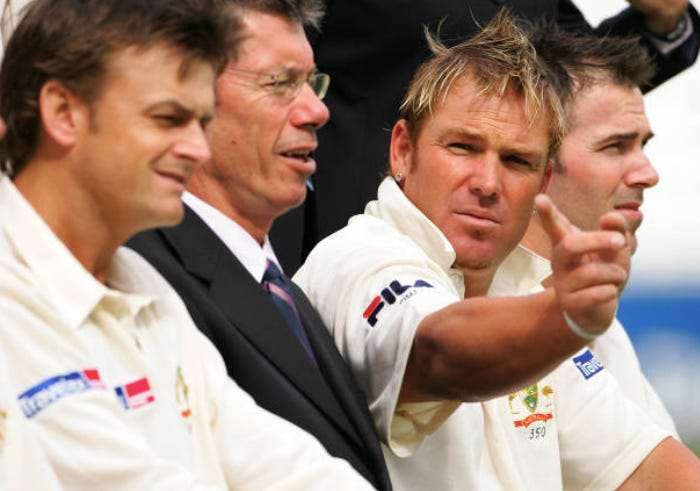
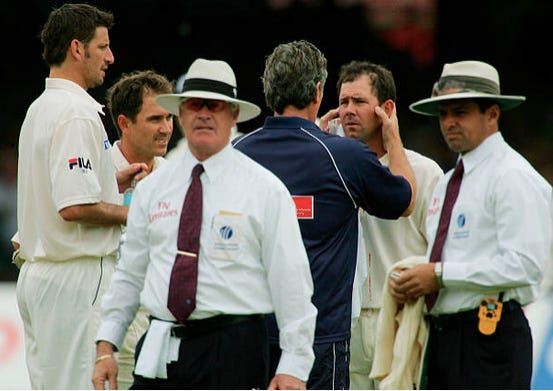
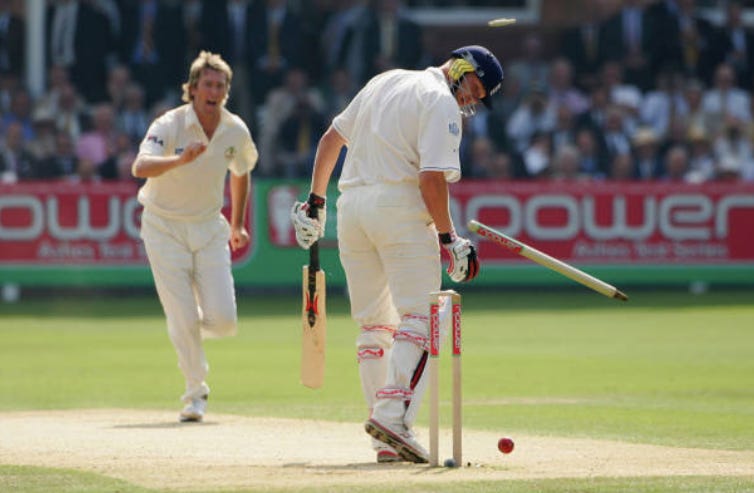
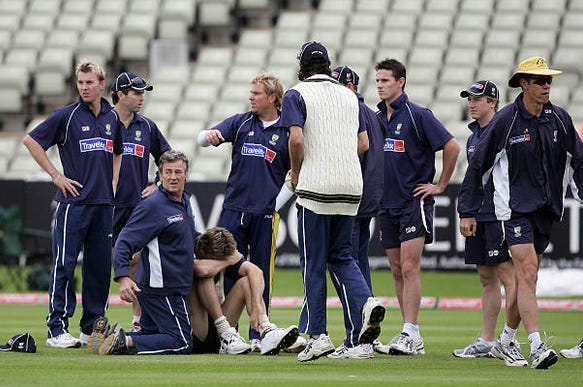
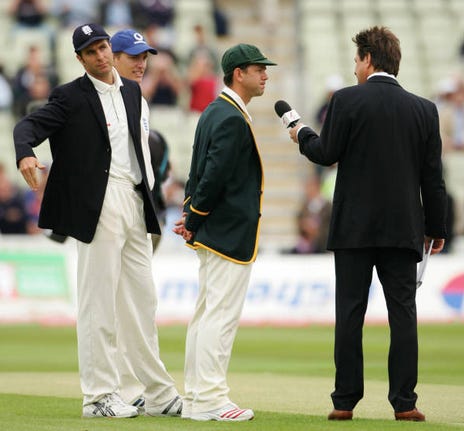
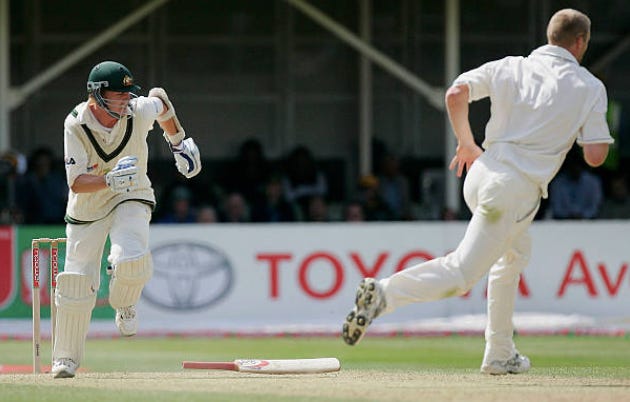
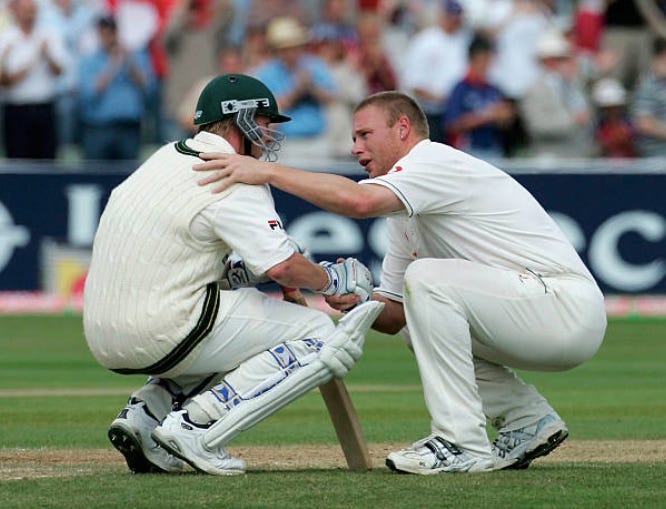

Great writing. I'm surprised you didn't get the call to write the Warnie mini series.